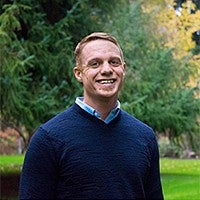
Lundquist College of Business
boggs@uoregon.edu | 541-346-4659
Courses: Leadership and communication
In my classes you will:
- Make connections to lived experiences and real-world challenges.
- Practice foundational, transferrable skills.
I was invited into the Teaching Academy because:
- I participated in the UO Summer Teaching Institute.
In what ways are you working to make your teaching inclusive?
In the field of Leadership Development, inclusion is paramount. Quite simply, Effective Leadership is Inclusive Leadership. In order to achieve the goal of becoming inclusive leaders, students are charged with identifying Leadership myths such as "Leaders are born and not made." The course includes activities such as "Draw a leader" which helps unpack our stereotypes about gender and leadership. Written reflections such as "A leader I admire" help students share diverse role-models from across cultures. Students are charged with developing an inclusive team culture by creating a team agreement that values difference and maximizes the team's diversity of leadership styles. The final project for the course allows students to plan a solution to a barrier for leadership development on campus. In this project, student interests and concerns culminate into innovative solutions to help student unlearn impostor syndrome, find female mentors, communicate across cultures or navigate identity barriers.
What do you do in terms of professional engagement with the teaching and learning culture on campus or nationally?
I consult, design and facilitate leadership development experiences for organizations and corporations on an international scale. This professional experience grounds my university teaching and helps me stay current on workplace trends in leadership development. This experience also informs my teaching approach, I continue to learn best practices, salient topics and innovative approaches in my work with corporations. I facilitate class as I would a corporate training, as such the student experience mirrors what they can expect in the workplace after graduation. I also present and attend workshops on leadership development and experiential learning at the Association for Experiential Education and the Wilderness Risk Management Conference. By engaging with the broader field of experiential learning, I have developed an international cohort of higher education colleagues who support my development and teaching both in-person and on-line through platforms like twitter and LinkedIn. On campus, I have observed my peers teaching this course each term, participated in co-teaching and have attended teaching engagement and diversity, equity and inclusion lectures on campus. I make space each week to read association journals, current leadership literature both scholarly and new leadership books. Lastly, I keep a teaching reflection log to help improve my craft.
In what ways was your teaching in this course research-led—informed by research on how students learn and inflected by UO's research mission?
At the beginning of the term and before each class, I articulate specific goals for student learning, structure small-group discussions and experiential learning activities during class. These activities are designed help students develop their personal theories of leadership development. However, research shows that an active-learning environment alone does not suffice-reflection is an essential process for transforming experiences - gained from the experiential activities - into genuine learning. Reflection is crucial for integrating the experience with the course material. It enhances students’ critical understanding of the course topics and their ability to assess their own values, goals, and progress. Critical reflection is an integral component of experiential learning connecting the learning to the experience. To reflect in experiential learning means to think critically about and analyze emotional responses to experiential activities in the context of course content and the learning objectives of a particular course or curriculum. I structure opportunities every week for students to reflect on their learning. Reflection, however, is not enough students must also connect their experience to research in the field of leadership development. I facilitate making connections from experiences and activities to the research that supports or contradicts their conclusions. Students actively research best-practices for leadership development and draw on theory and research to help them achieve success in the Leadership Development Project.
What made you want to be a teacher?
Wilderness expeditions lead me to my career in teaching and the discipline of leadership. Through backpacking and sea kayaking adventures in remote corners of the world, ranging from Arctic Scandinavia to Chilean Patagonia, I discovered the incredible transformation of individuals and teams capable of resilience, community-building and great achievements. These powerful experiences catalyzed my passion for teaching and fascination with leadership. Why leadership: "The simple answer is that the subject itself matters — to our lives, to the growth of our knowledge, to the success (or failure) of our political institutions, and to our every effort collectively to promote the public good. Leadership failures are not simply curiosities or idle personal tragedies; they can produce catastrophic consequences for millions of people. Modern technology increases the scale and multiplies the risks of leadership failure. These evident disasters add a sense of urgency for efforts to improve our collective skills as leaders and followers." -David Frohnmayer
